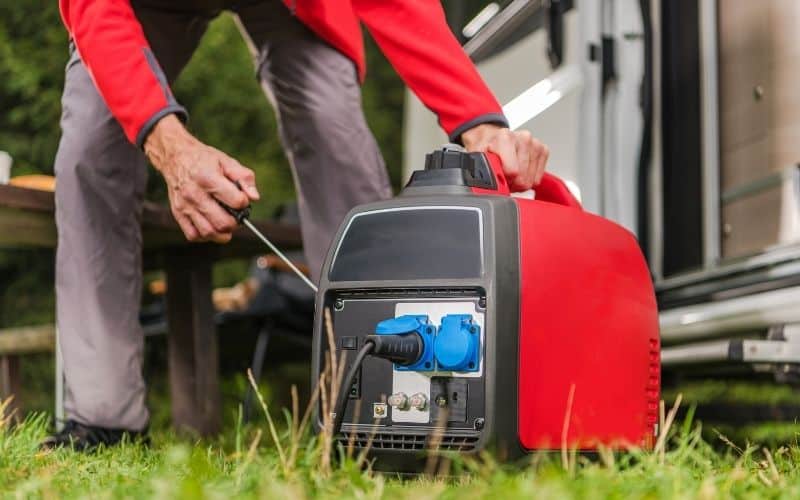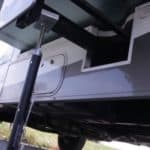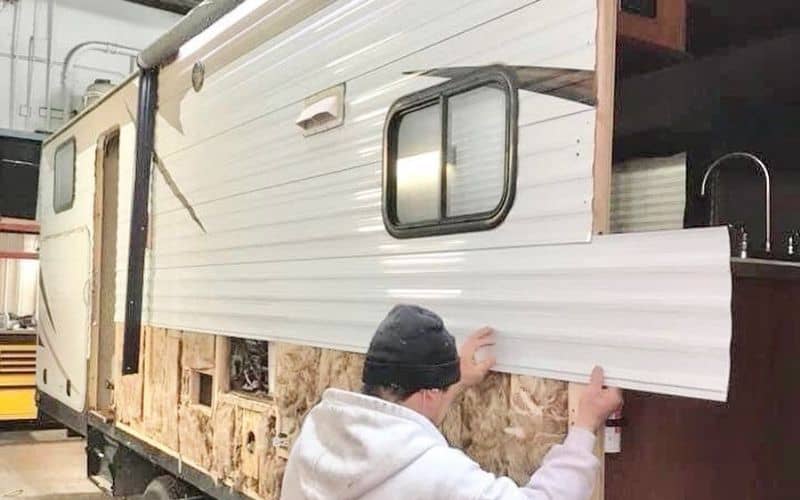An RV provides you with the ability to bring the comforts of home with you when you answer the call of the open road.
Though electricity can be a real challenge if you like to boondock off the grid, or you frequently stay at campgrounds that simply don’t offer electrical shore power connections.
RV generators stand up to these challenges, by offering convenient access to electricity when it otherwise isn’t available.
Though you might be wondering just how much fuel your generator will use?
The ballpark average is that a 4,000-watt diesel RV generator, that is running at half-capacity will go through less than 1 gallon of diesel fuel every hour. Though if you turn it up to full capacity it might go through a gallon an hour to keep up with demand. These numbers can vary for less efficient, but more common gasoline generators, and “Dual Fuel” generators that can work on propane or gasoline
How much fuel a generator can run on will depend on several factors.
The Different Types Of RV Generators: Gasoline, Diesel & Propane
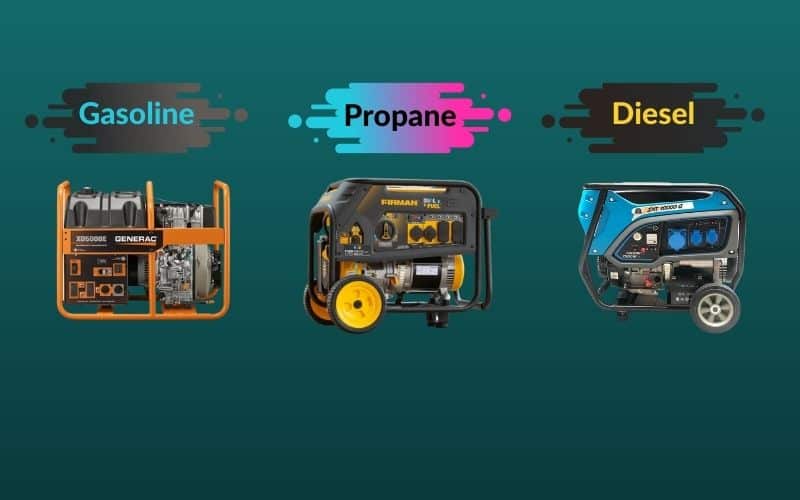
Diesel Generators
This are more fuel-efficient than gasoline, which means when it comes to fuel efficiency, you will get a longer run time per gallon.
They can also be run at over 50 to 100% without a significant loss of fuel efficiency, which happens with many gasoline generators.
Though the trade-off is that you tend to pay more for a diesel generator upfront.
Unfortunately, a lot of diesel generators are too large and too heavy for practical use in an RV.
Though there are a handful of diesel generators out there that could feasibly be transported by or installed into a large RV like a Class A motorhome.
Gasoline Generators
They aren’t as fuel-efficient as diesel, but can still run your RV’s primary power for a multi-day camping trip off the grid.
Gasoline is also easier to find in some parts of the country than diesel and generally has a lower price per gallon.
It’s also worth noting that there are two different types of gasoline engines in generators.
Two-Stroke
gasoline generators tend to have slightly higher fuel consumption. They are also prone to spark-plug and carburetor problems, which can shorten their lifespan.
You also have to correctly mix the right ratio of oil with gasoline. If you don’t have the right oil, you can’t safely run it, which can be an issue if you are boondocking far away from civilization.
While they are often the least expensive type of RV generator, they are also likely to return the lowest return on investment in both fuel efficiency and lifespan.
Four-Stroke
gasoline generators run just like a car. They do need oil changes and routine maintenance.
Though they tend to be quieter, run longer, and offer better fuel efficiency than a two-stroke gasoline generator.
This is one of the more common portable generators for power an RV campsite.
Propane Generators
They are known as “Dual Fuel” generators. They can burn gasoline or propane.
When they are set up to burn propane they are generally less efficient than when they are running on gas.
The numbers can vary from one model to the next. On average, a propane generator will burn through two and three pounds of propane in an hour.
This translates into an average of five hours of runtime out of a 20-pound tank of liquid propane.
Ultimately, a dual fuel propane generator is best to run on propane when you are running out of gasoline, or you find yourself at the end of a trip with a lot of propane left in your tanks.
If fuel consumption is a concern, propane is your least favorable option for good fuel efficiency.
RV Generator Size & Fuel Consumption
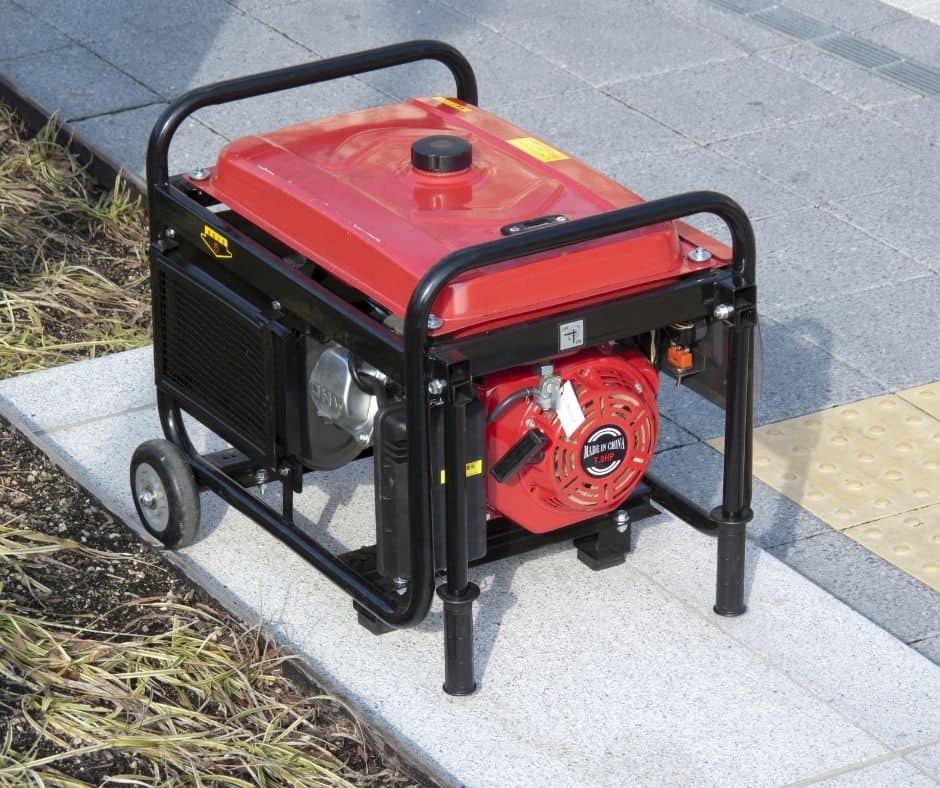
A generator that produces up to 4,000 watts is the benchmark you need to keep in mind when shopping for a unit that can keep up with the RV’s rooftop air conditioner.
This is often the appliance with the highest power consumption and the thing you are most likely going to prioritize over the microwave or flat-screen TV.
Just bear in mind that if you go with a generator that is rated to produce 4,000 watts when running at peak capacity will need to run full bore to keep up with the general demand of the RV’s air conditioning system.
This will give you the least fuel efficiency and the highest fuel consumption compared to wattage production.
Generator weight and size are things that are easy to overlook when you are shopping online.
Though it becomes an issue that looms large when it comes time to use that generator in the real world.
Generally, the larger a generator is, the higher the power output and the more fuel it will burn through in a given period of time.
Load Can Affect Generator Fuel Consumption
Load is the amount of power in wattage demand being drawn on the generator, and it can also affect the fuel consumption or overall fuel efficiency of the generator.
Especially if we are talking about a gasoline generator that has built-in inverter technology.
Just how much fuel your generator burns through at any given period of time will also depend on how much load you are putting on it.
When you are running a lot of appliances, electronic devices, and lights, the higher load demand will require the generator’s engine to run at higher revs.
This will burn through more fuel. A lot of gasoline and dual fuel generators become less fuel-efficient when you run them over 50 to 75R% of their maximum capacity.
Inverter Technology & Generator Fuel Consumption
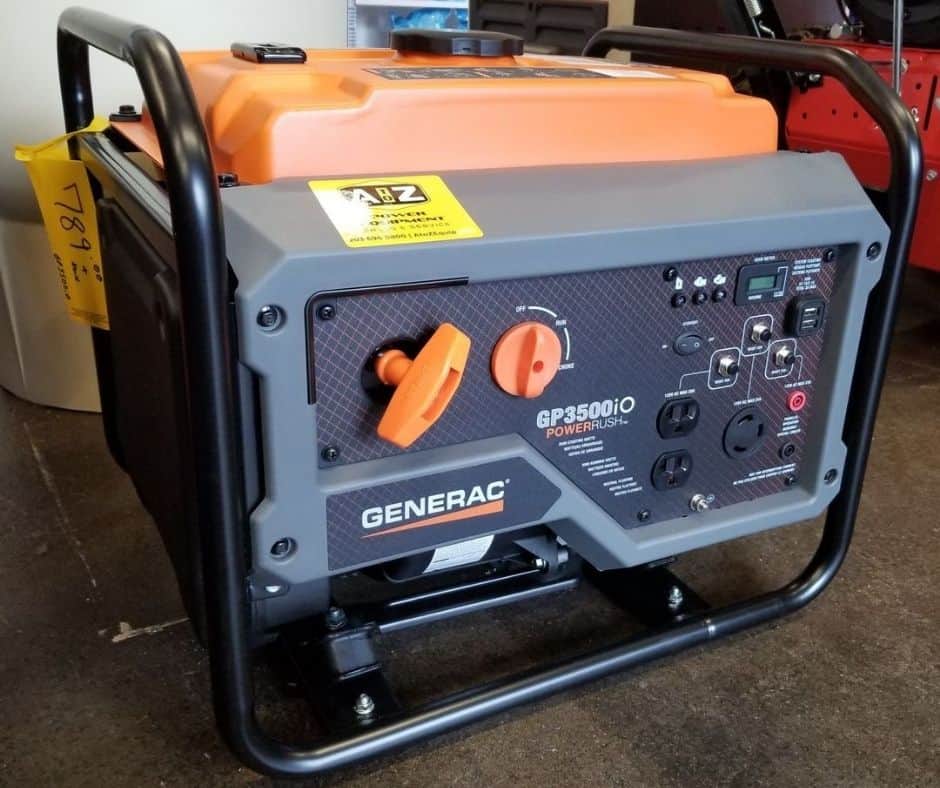
It’s important to note that the terms “Inverter” or Conventional” can also influence the fuel consumption and performance of an RV generator in certain situations.
It’s also worth bearing in mind that inverter generators are not designed to run at full capacity all the time.
Most inverter generators will provide you with statistics for their optimal operating conditions.
You’ll often see this represented as the number of hours it can run at 50% or 25% of capacity.
If you push an inverter generator to 100% all the time, you will see increasingly poor fuel consumption, on par with a conventional generator.
Example Diesel Generators For An RV
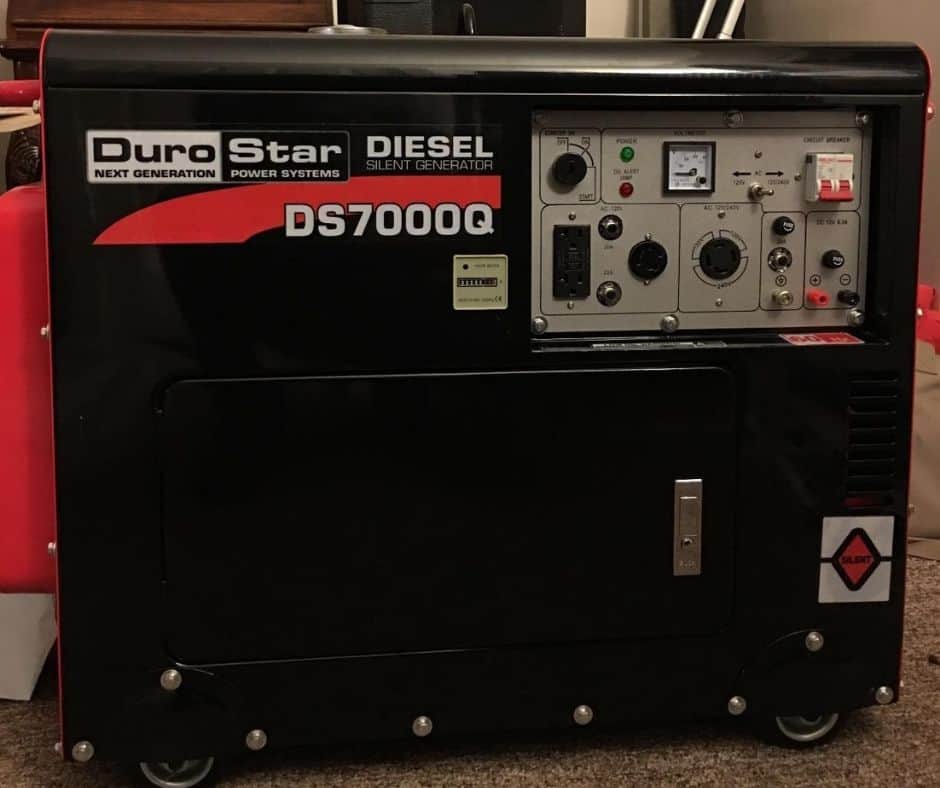
The following table breaks down some of the best diesel-powered generators for an RV.
Some of these are portable generators, though a few can be permanently installed in fifth-wheel trailers or motorhome that has the proper hookups.
Name | Maximum Wattage | Fuel Capacity | Fuel Consumption |
Generac 6864 | 5,000 | 12 Gallons | 32.5 hours @ 50% Load |
Gillette GPNDL-60E  | 5,000 | 4 Gallons | 10 hours @ 100% |
DuroStar DS7000Q  | 6,500 | 3.8 gallons | 6 Hours @ 100% |
Example Gasoline Generators For An RV
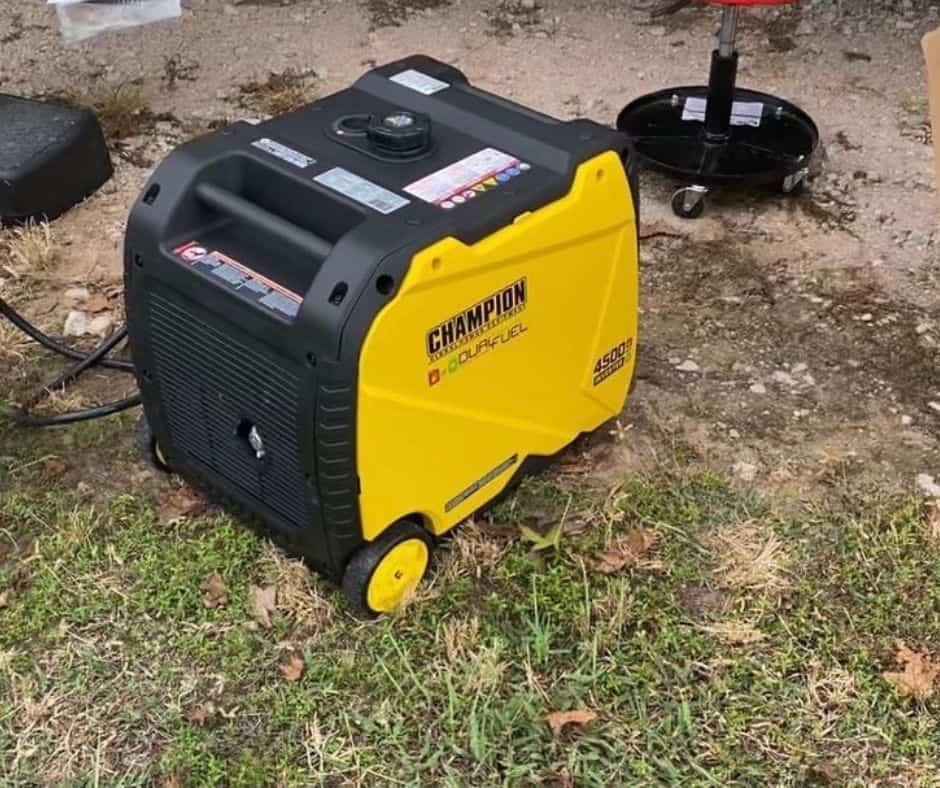
Gasoline generators represent the most convenient fuel source and weight for RV and campsite use.
In this niche, four-stroke gasoline generators tend to run quieter and have fewer problems than their two-stroke siblings.
Though there are a few budget-priced two-stroke gasoline generators that might get your RV by if you only occasionally boondock off the grid.
Name | Maximum Wattage | Fuel Capacity | Fuel Consumption |
Honda Power Equipment EU3000IS | 6,000 | 3.4 gallons | 20 hours at 50% capacity |
Champion Power Equipment 200987 | 4,500 | 2.3 gallons | 14 hours for3,500 watt load |
Craftsman C0010030 3000i 50 St | 3,000 | 1.1 gallons | 4.5 hours @ 50% capacity |
PowerSmart 4400W Open Frame Inverter Generator | 4,400 | 2.5 gallons | 16 hours at 50% capacity |
The Briggs & Stratton P4500 Portable (030836) | 4,500 | 3.4 gallons | 18 hours at 25% capacity |
Frequently Asked Questions
What Does It Mean To Run A Generator In Parallel?
With an inverter-style gasoline RV generator, you lose a lot of fuel efficiency when you run it at 100% capacity.
One of the ways to maintain modest fuel consumption is to run two generators in parallel.
This involves running them both at the same time, and the optimal capacity level stated by the manufacturer.
They are then interconnected through a shared to the RV’s house batteries or directly to the power connection port.
Running two RV generators in parallel allows you to run both generators at half capacity for better fuel efficiency while getting the combined wattage output of both.
It’s a great way to make the most out of your fuel supplies if you happen to have two similar generators.
Do I Need To Worry About Old Fuel Affecting My Generators Performance?
Gasoline breaks down over the course of a few weeks. This can leave you with tank deposits that affect performance as well as potential maintenance issues and fuel-efficiency problems with the generator attempts to burn the separated gas.
If you plan to store a gasoline generator for more than two to three weeks, you should pour a high-quality fuel stabilizer like Sta-Bil, in the tank according to the manufacturer’s instructions.
If you are planning to store a diesel generator then you will need to use a specifically formulated diesel stabilizer.
What Is An Electric Generator?
The term “Electric Generator” is a little bit of a misnomer. These are large battery pack “Power Stations.”
Before you leave on your RV adventure, you charge it by plugging the power station into a standard wall socket, and they charge up for several hours.
This will give you an impressive amount of electricity for a few hours of run time. The amount of charge it can hold will vary by size, battery type, and manufacturer.
Though it is incapable of producing more electricity on its own without being plugged back n and fully charged.
Conclusion
Understanding your RV generator’s fuel consumption helps you understand how much fuel you need to bring with you.
If you want minimal fuel consumption and the ability to run the generator near the maximum capacity, without sacrificing fuel efficiency, then a diesel generator might be at the top of your list.
Though they tend to cost more, take up more space, and might be prohibitively heavy for a smaller RV.
If you need to charge sensitive electronics, and you need a generator that can occasionally run the RV’s rooftop AC, while revved up to maximum capacity, then a gasoline RV generator might be the best option for you.
If you have the budget, you can even run two inverter generators in parallel for the best fuel consumption to wattage production.

